Author:
Audience Rating:
Publication:
Genre:
Character Age:
TG Themes:
Permission:
The Passenger
by Bryony Marsh
It was to be exile, to a property the family held in Montana. Montana, of all places! I had become an embarrassment and would be hidden away to avoid a scandal. Perhaps Father hoped there would be fewer reporters – fewer visitors of all kinds – to see what I had become. When he wished me “bon voyage” there was a sense of finality about the meeting and I suspected that I would never see him again.
It hadn’t always been like that. At one time I had basked in the warm glow of his pride, as I won colours and trophies at school. I had been a cadet – and a successful one at that. There had been talk of a place for me in the Guards, or perhaps the Household Cavalry.
Then came the night I found the locket. Perhaps I shouldn’t have been poking around in things that didn’t belong to me, but I was always one to explore and to push at boundaries. I knew that the servants would have prevented me from ascending the stairs that led to the top floor of the east wing so I waited until two in the morning to conduct the mission – just as if I were a character in one of the ‘penny dreadfuls’ that Mother so disapproved of my reading.
I knew where the spare keys were kept. I was sure that borrowing them at that time of night would be simplicity itself – but what would I find on the top floor, which had always been out of bounds?
Paintings in the French style, with an abundance of flesh and a paucity of clothing: that was my brother Jonathan’s theory. In this he was quite wrong, for when I unlocked the heavy oaken door and pulled it aside I found nothing that was particularly unusual. Instead, there was a home within a home – complete with a sitting room, bedroom and bathroom. There was no provision for the preparation of food, but I saw that the dumb waiter extended to this floor, the suite being located above the kitchens.
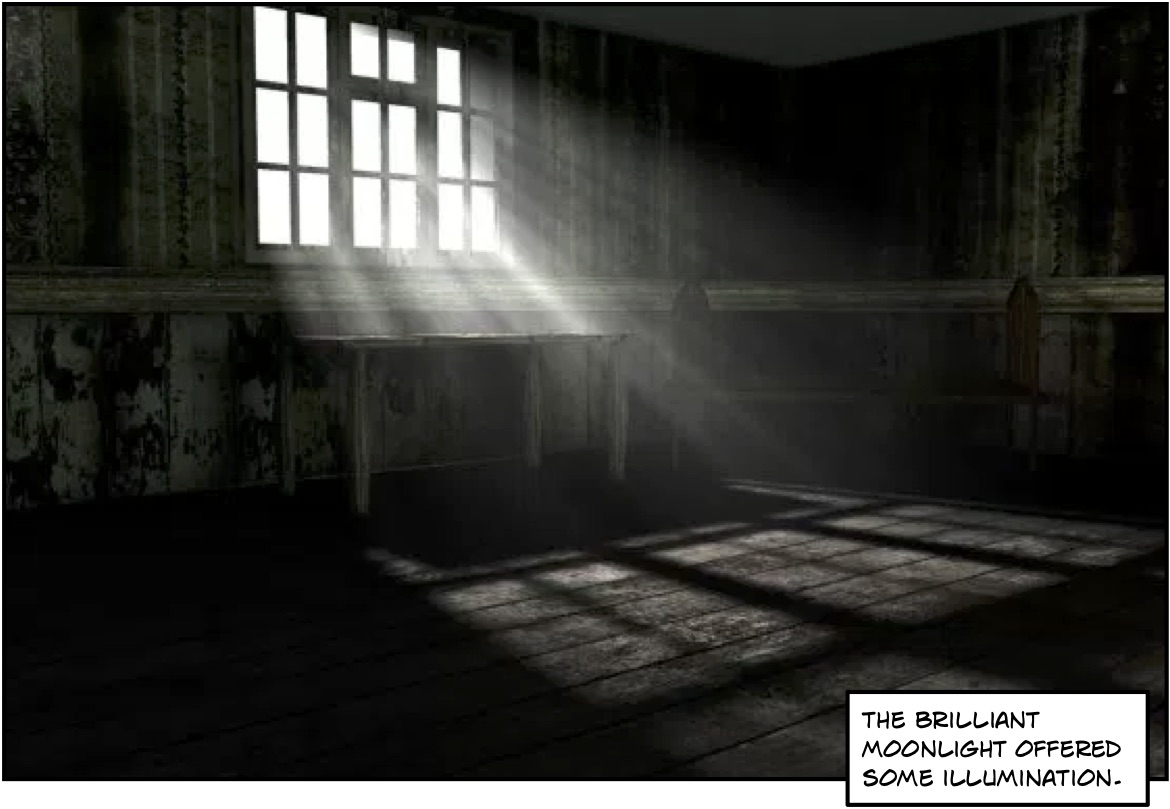
Whoever had lived in those rooms – and likely been imprisoned in them, given the stoutness of the door and the bolts on the outside – was long gone, although the furnishings that remained behind suggested that a woman had lived here.
So our family had once kept a mad old woman in the attic? A classic plot element in several of the stories that I had read. Who she might have been, I couldn’t have said.
The place had been emptied of clothes and personal effects. With reluctance, I accepted that the occupant’s identity would not be revealed to me that night. Perhaps some cautious questioning of the older members of staff might reveal the truth to me, later.
It wasn’t until I turned to leave that I noticed the locket, sat atop a coiled silver chain. It was on the mantelpiece and I was surprised that I hadn’t spotted it before.
Perhaps the portrait that the locket held would provide a clue as to who had been imprisoned?
I reached for it – and in that moment my fate was sealed.
Examining it by lantern light, I discerned at once that it must be valuable. The fine pattern traced upon it was like something from the House of Fabergé, and the whole was deceptively heavy. I wondered if it might, in fact, be solid… but I had identified the catch and it popped open readily enough.
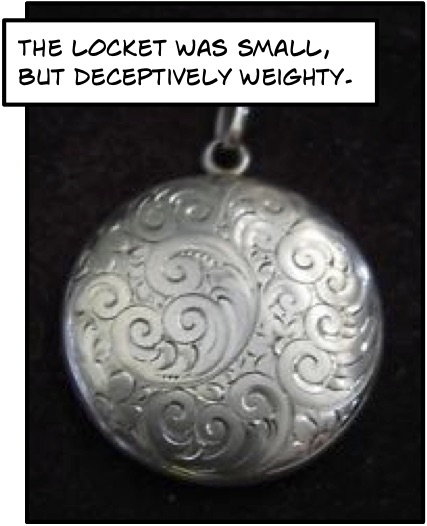
Inside I found no portrait, but instead a dark, highly polished surface like black mica. For an instant I thought there was a face within its depths, but when I looked more closely all I could see was my own reflection.
At once, the locket felt unnaturally warm in my grasp. I gripped it tightly, causing it to snap shut. As I held it in my fist the strangest sensation came over me, that I was the locket’s owner. Not in the simple “finders, keepers” sense… but that I had lived in these rooms.
Who was I, then? I didn’t know… but at that moment I was the woman who owned the locket.
Seeing that the door stood ajar, she felt delight – and I felt it, too. At last, she could leave these rooms where she had been confined for so long. I wondered what she looked like, but since she didn’t pause in front of a mirror, this remained a mystery. She had delicate hands and small, bare feet. She wore a simple nightdress and a lace wrap.
It was she, not I, who ran lightly down the stairs and out into the grounds. She was delighted by the moonlit garden and astonished at how tall some of the yew trees had grown. It was clear that she knew the place well: she walked faultlessly through the small maze, to watch the fish in the pool on the far side.
At last, as dawn began to show, the locket cooled. I was myself again, no longer the unknown woman – although I fancied that something of her stayed with me. I wondered what I should do, but decided at once that I couldn’t bring myself to admit to Father what I had done, in case he took steps to ensure that the locket was placed forever beyond my reach. I wanted – needed – to know more about the strange woman and the waking dream that the locket had brought me.
The best course of action, I decided, was to leave everything as I had found it, replacing the locket and barring the door. I was sure that I could borrow the keys again, having succeeded once.
I was tired, all through that that day, but I couldn’t stop thinking about the locket and the woman that I had ‘become’. To have heaped this voyeuristic thrill atop that of marauding at night; of being out of bounds… perhaps it was too much for a young mind to take. I wanted to experience that strange sensation again!
The next night, I was too tired for any roaming. I slept right through but awoke determined that I would creep through the house at the next opportunity, to retrieve the locket and use it again. I wondered how often the closed up rooms were visited and how long it might be before that extraordinary trinket would be missed if I kept it. Even at that early stage, being apart from the locket made me anxious, as I feared that somebody else might find it.
For perhaps a month, my nocturnal adventures with the locket remained a secret. Mother chastised me for the dark bags that were always to be seen under my eyes, pleading with me to get more sleep. Father gave me dire warnings against the excessive masturbation that he had decided must be at the root of my loss of energy. For my part, I was euphoric: it must be some secret of the afterlife, I had decided, whereby a spirit such as the woman I had discovered could be brought back to life, for a time. I hadn’t managed to communicate with her in any sense – in fact, when I grasped the locket it seemed that I ceased to exist, except as her – but I experienced her meanderings through the sleeping house and its grounds. She never uttered a word and radiated only a calm, placid nature that seemed to match her natural grace.
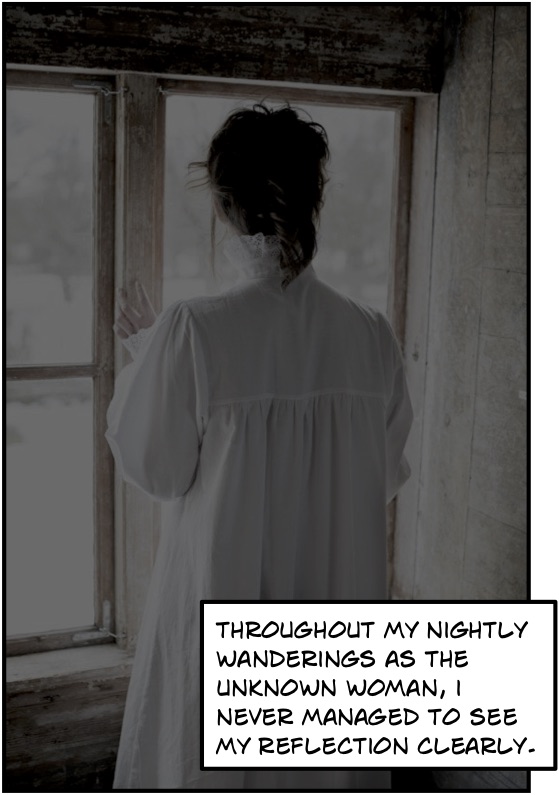
And each time she went away, I found there was a little less of me to take her place.
It couldn’t last, of course. By the end of that month I sometimes felt that the nightly hauntings were more real to me than the exhausting business of keeping up appearances by day. The privileged life of the youngest son of a peer is undemanding, but I was expected to take some interest in the wider world and the social calendar. Visitors began to remark upon the changes they found in me, and it seemed that it was my mannerisms that betrayed me: unconscious moments when I reacted not as myself but as the unknown woman.
Felicity Gale, a sweet girl with whom I had once flirted my way through mixed doubles, piano recitals and the like, was surprised and disappointed to find that I was no longer quite so puppy-dog keen to win her favour. At first she assumed there was somebody else and took it as a challenge, but there was only myself – when I grasped the locket. Felicity was a wholesome and kind girl, but I shut her out of my life as I replied “no thank you” to everything she suggested over the Easter period. None of the other callers took her place in my affections.
I tried to stop using the locket. I tried to leave it where I had found it, but even when I was convinced that I had left it on the mantel in those lonely rooms, I would find it in a pocket. Even in the pocket of a garment not previously worn.
I must be going mad, I decided. There was a contamination: a leakage from the secret life that I was leading by night that spilled over into the waking world that I shared with others – and they were noticing the change.
Father had decided that I was going through ‘a phase’ and needed to be brought back to the path of righteousness, by hook or by crook. I suspect that this made matters worse because with each exchange he simply made it less pleasant for me to be… me. When he spoke of his concerns that I would bring shame on the family by becoming a sodomite, I thought: what’s the very worst that he can do to me?
The rooms at the top of the east wing, I decided. He’ll have me declared mad and lock me away where I can’t disgrace him. And perhaps I would go mad, deprived of liberty and human contact… but it would also free me from the exhausting business of needing to be two people: one by day and one by night.
I surrendered myself to the notion.
“You’re right, Father,” I told him. “You’re absolutely right. Do as you must, because I can’t change my behaviour.”
He surprised me with the Montana plan. There was work to be done in that far-off place: hard work involving a vast acreage of cattle, forests to be cut for timber and so on. Just the sort of place to send a wayward son, to toughen him up.
Well, perhaps.
That’s how I found myself booked on a vast steamship, heading for New York. A gilded cage, at least: the accommodations were the finest I had ever seen aboard a ship.
The locket came on the voyage as well, of course. I didn’t mean for it to come and I had no memory of retrieving it from the locked rooms in the days before my departure… but somehow, there it was in my trunk.
I knew that this was a defining test of my character: that I must somehow muster the courage to drop the thing over the side, sending it down to the ocean deeps before we reached New York. If I could do that, I might be able to serve out my exile, rebuilding my life and making my father proud once again.
The night of the fourteenth of April was bitterly cold. My fellow passengers were below decks, perhaps finishing their brandy and cigars. In the ballroom the band played a waltz, though it was nearing midnight and most people would by that time have been thinking of turning in.
I was at the rail, holding the locket by its chain so that it dangled it over the dark water. I was safe from its effects, holding it in that way, although its appearance remained most alluring.
Surely, a trinket such as this must be worth a fortune! I should keep it, at least until New York, where it would fetch a handsome price…
All the foolish arguments of the addict. It had to go.
One last look at the interior? No! It had to go!
My fingers were cold. Soon, it must slip from their grasp. That would serve, wouldn’t it?
The ship shuddered. Had the engines been thrown into reverse? There were shouts: she commenced a lumbering turn.
I looked ahead and saw the reason for the turn: an iceberg! Though I was on the highest deck, it towered above me. It seemed that we had turned in time, though, for as the wall of ice swept past I wasn’t wiped away – but then the ship lurched as she struck some unseen, projecting spur.
The impact sent me to my knees and I forgot all about the locket.
There was some nonsense talked in the confused hours that followed: that the ship was unsinkable and so on… but she began to go down by the bow and a volley of distress flares were fired.
Having already been on the Boat Deck when the emergency began, one might have thought that I was well-placed to survive what followed, but it transpired that I was poorly qualified:
“Women and children first!” the cry went up all around, causing dismay among those of us who had come promptly to the muster point, only to be turned away by the crew.
I saw lifeboats being lowered even though they were half empty, simply because there were no more women or children to be found… and all the while, members of the crew ordered us away. As if we couldn’t be trusted to act responsibly!
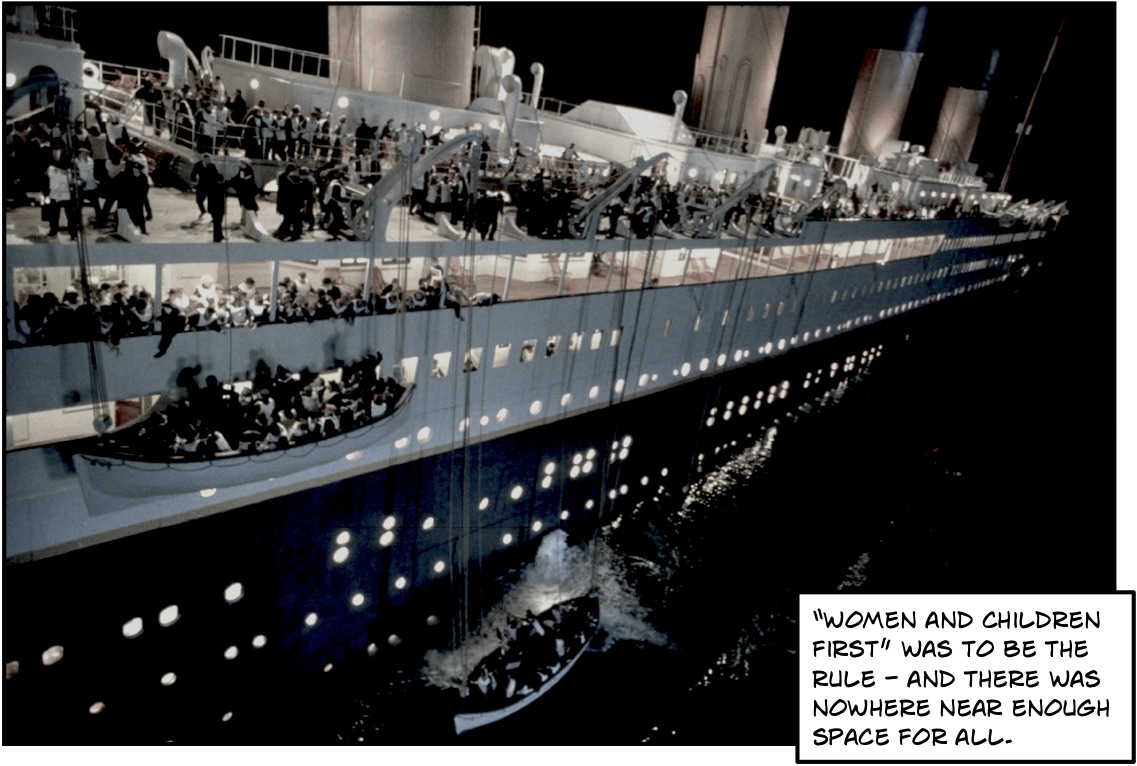
I was shivering, from terror as much as from the cold. As the deck took on a distinct angle, the sea remained obstinately empty: if another ship had seen our distress flares it was still too far away to offer assistance. Our pathetic collection of lifeboats were meant to be used to ferry passengers to another vessel, not as a refuge in their own right.
Just five boats remained, now. I felt numb – although I knew that the embrace of the sea would be far colder.
Thrusting my hands deep into the pockets of the pea coat that I wore, at once I found the locket. Of course: it would be there, wouldn’t it?
I had never tested the power of the locket among others. My haunting of the house and gardens at home had always been a solitary affair but it had felt real enough: I had been no mere phantom. Could the locket once again transform me into the unknown woman, thereby allowing me to board a lifeboat?
And… would I want it to?
This was my dilemma: even assuming that it worked and the locket didn’t simply produce an hallucination, I suspected that its use in this way would represent an act of surrender. The locket had brought me nothing but disgrace and exile. I had come within a whisker of dropping the thing in the ocean, yet now I found a reason to entrust it with my life?
I knew that I was not a brave man. Perhaps I had been, before this madness began, but no longer.
I chose to use the locket.
I ducked into a shaded nook, as if to escape the worst of the wind. When I was certain that nobody was looking my way I gripped the locket in fumbling fingers. At once they were warmed by that strange glow… and I regarded the scene about me with other eyes.
So: if it was a form of madness then at least I would be comforted by the waking dream of life as the unknown woman. Already I felt her strange clam; her sense of acceptance, come what may. I was consoled. Even barefoot and clad only in the nightdress and wrap that had barely been sufficient for walking in the grounds at home, she was content.
A small smile played upon her lips and I knew that death held no terror for her.
It seemed that others were less calm, however.
“Miss! You’ve got to get on the boat!”
Somebody was manhandling me towards a lifeboat – one of the last. I felt confused, as if I had just awoken from a deep sleep.
“What?” I couldn’t take it all in. In that befuddled state I allowed myself to be jostled into the boat, crammed with people of all kinds. Somebody placed a coat around my shoulders.
The boat was lowered expertly, to float in a sea already littered with flotsam. Water splashed us, burning-cold. With three long oars on each side, our tiny vessel was steered away from the stricken liner, then rearing up at her stern.
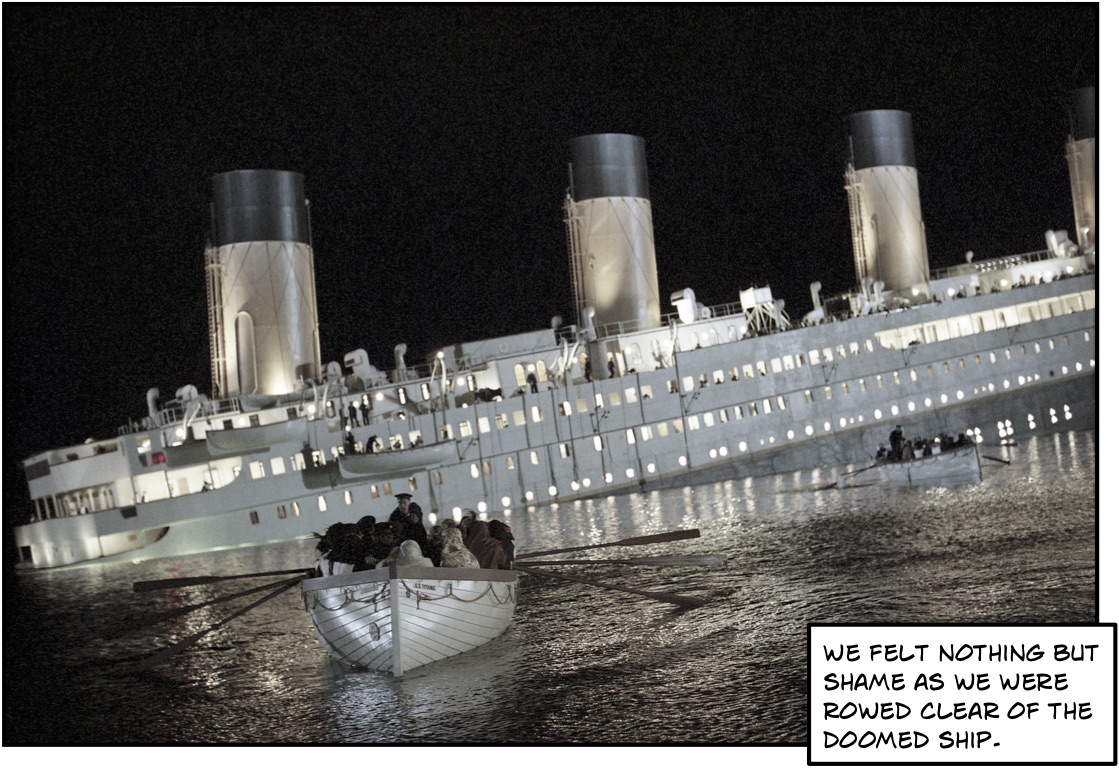
There came a moan from a thousand throats: from those still aboard who knew in that moment that death was just seconds away. It is a sound that will remain with me for the rest of my days.
I lost the ability to move. At first, it was the cold. We were barely alive, but to live at all seemed impossible when so many had died. We were plucked from our little boat around dawn and though they gave us dry blankets and cocoa, something inside me stayed frozen.
Days passed.
I was somehow held in abeyance. I wouldn’t speak to a soul.
Sometimes they placed food in my mouth and at such times I chewed and swallowed but I did nothing of my own volition. I was transferred to a hospital where I shared a room with some others who had also been through the disaster.
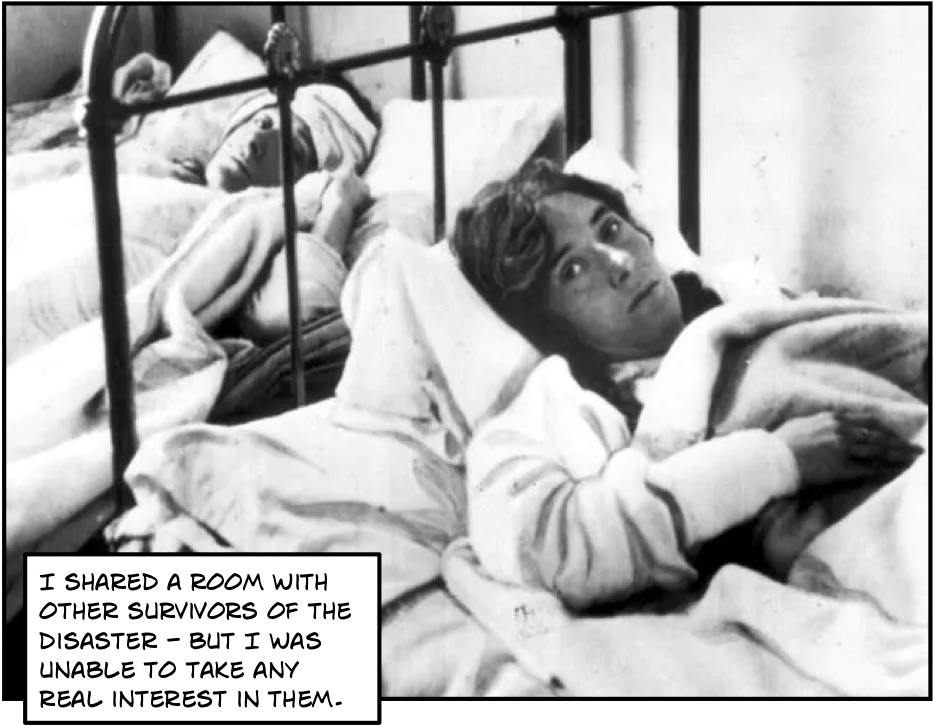
Doctors conferred, within my hearing. Some said the cold had caused a kind of stroke and robbed me of my mind. Others said my ailment was caused by the horrors of that night: that I would recover, in time. There were other theories as well, some with complicated medical names that meant nothing to me.
My hands, face and feet were blistered and swollen. A mild case of frostbite, they said: it would not result in any permanent damage. As my circulation returned, dead skin began to slough away and I must have looked a terrible sight.
One doctor wanted to pry my fingers open, to get at the locket in my right fist. He reasoned that it might offer a clue as to my identity, but my fingers were seized fast. Neither I nor any of the doctors could persuade those fingers to relinquish their grasp. It was decided that this could wait.
Days passed. Perhaps I felt a little more comfortable, at last.
“Is she in here?” Anxious voices in the corridor.
More quietly, the newcomers were admonished with words that I couldn’t make out. I wasn’t very interested anyway.
A doctor showed a man into the room. I only saw him peripherally, but I sensed his anxiety – and perhaps horror as he regarded my face. He stared at me for a long moment.
“Is this your wife?” the doctor prompted.
Before he could speak, two small children dashed in, having evaded a staff member who had tried to keep them in the corridor.
“Is it mama?” the girl demanded, clinging to her father and looking in my direction.
The tragedy of the sinking was still being played out, I realised. It wasn’t yet known – not for certain – who was alive and who was lost. This husband had lost his wife and two children had lost their mother, somehow, in that night of chaos.
I wondered who she had been.
“It is mama!” the boy cried, dashing to my bedside. He grasped my hand – the one with the locket squeezed tightly – in both of his.
It pulsed as warmth again filled my hand. Was this what the locket had intended? Was the unknown woman whose form I inhabited not in fact a ghost from the past, but rather a manifestation of what might yet be?
It seemed the woman herself didn’t have an opinion. She remained motionless: a blank slate characterised by supernatural calm. While she exuded nothing but patience, my thoughts galloped.
Was this what the locket was for? Had all the unhappy events of recent weeks led up to this moment and this decision? If I so chose, could the locket avert one particular tragedy from that terrible night?
I sensed that this was so… but if I surrendered now to the power of the locket, what would become of me?
“Henry! Come away!” the man’s anguish was plain. “It’s not your mama.”
I wondered: could I save Henry and Olivia from their terrible hurt?
Olivia? How did I know her name?
The locket pulsed more strongly and I felt my features subtly rearranging themselves. I didn’t know what the dead woman looked like, but little Henry did and it seemed that this was sufficient. As I changed physically, my mind began to change as well. It seemed that a new path was offered to me and I packed away William, my old self, rather as one puts away childhood toys. Of what would replace him, I had no idea.
I blinked. Coughed. In a voice rusty from disuse, I said:
“Henry. Olivia.”
No doubt my own family would cope. Father might even consider that he’d got off lightly. Jonathan could remember me from earlier days and perhaps imagine me the hero, giving up a place on a lifeboat to one more deserving. Mother… she would have understood what I chose.
“I’m sorry, my darlings,” I said. The American accent was new.
“Rachel?” The man was at my side, now, staring at me in wonder.
I was tired. Terribly confused. I knew that there was much I wouldn’t remember… but at last the unknown woman had a name – and a role. Wife. Mother. Convalescence would be long, but the time would pass happily now that I was reunited with my family. I felt their love for me, plus the tremendous sense of peace that the locket always brought. They had prayed that I would be delivered and I had returned to them.
I should never have gone to Paris, I told myself. But you’re safe now. Be brave – for the children.
When I managed at last to escape from Henry’s grasp I opened aching fingers and found that my hand was empty. For a moment I wondered where the locket had gone, but Ernest was telling me about how they’d heard the news of the sinking and waited through three terrible days until the Carpathia reached New York, where he hadn’t been able to get through the crowds to search for me… and then he couldn’t hold back his tears any longer – and of course Olivia and Henry joined in…
I decided that a missing piece of jewellery was unimportant, in the scheme of things.
+ + + ENDS + + +
If you enjoyed my story, please consider putting something in my tips jar by purchasing one of my books on Amazon? (Or read for free with Kindle Unlimited and I’ll get a buck...)
For more stories, links and behind-the-scenes discussion of the TG fiction genre, come and visit me at Sugar and Spiiice: https://bryonymarsh.wordpress.com
If you liked this post, you can leave a comment and/or a kudos!
Click the Thumbs Up! button below to leave the author a kudos:
And please, remember to comment, too! Thanks.



Comments
Well, told
Thanks for posting this.
Hugs,
Erin
= Give everyone the benefit of the doubt because certainty is a fragile thing that can be shattered by one overlooked fact.
Lovely story
Lovely story, well written.
Thank you.
Ditto the previous comments
Thank you. So touching.
>>> Kay
Different, unusual and briliant!
Thanks you so much for this story, it made my day!
Love,
Monique.
Monique S